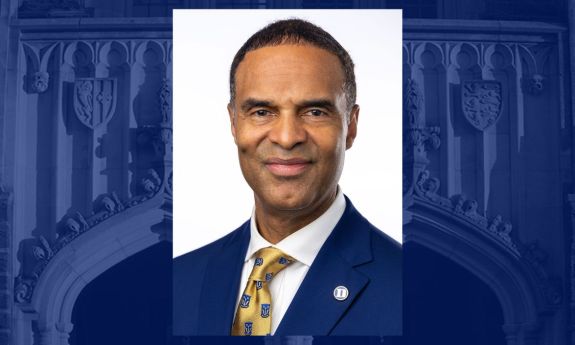New Initiative to Address Conflicts in Middle East
Provost says effort meant to foster constructive discussions on highly contested issues

Editor’s Note: The following message was sent by Provost Alec Gallimore to Duke students, faculty and staff Monday afternoon.
Dear Duke Community:
The violence in the Middle East over the last four months has reverberated across our campus. The underlying conflicts, particularly between Israelis and Palestinians, are profound and longstanding. Members of our community hold diverse and at times opposing perspectives; for some, they are connected to a long history of pain and suffering, including being subjected to antisemitism, Islamophobia, anti-Arab bias and other forms of hatred. I’m grateful for the many faculty members who have spoken with me about the resources needed to support them and their students in this challenging moment.
As many of you told me, communications about these conflicts can be fraught. We all have varying depths of knowledge, and the language used is often highly contested. But as members of a pluralistic community who strive to practice civil discourse, we shouldn’t shy away from conversations just because they’re difficult. While Duke has hosted a number of events on this topic with speakers representing a variety of viewpoints, we must do more to ensure our campus environment makes space for rigorous and respectful debate involving people with differing opinions.
Today, I am launching a new initiative to address this need for learning and engagement. The goal of the Provost’s Initiative on the Middle East is to foster constructive dialogues on these multifaceted and emotionally charged issues that will enhance understanding and build skills that lead to shared learning. The initiative will leverage the talent and expertise of the Duke community, judiciously supplemented with outside voices, and seek to nurture a sense of community, particularly among individuals from different backgrounds, experiences and points of view.
I’ve asked Bruce Jentleson, the William Preston Few Distinguished Professor of Public Policy and Professor of Political Science and an expert on the Middle East as well as international security and U.S. foreign policy broadly, to lead this effort. Dr. Jentleson will work in partnership with Vice Provost Abbas Benmamoun and Associate Provost Noah Pickus and in consultation with a faculty working group and others in the campus community, including academic programs in Trinity College with expertise on the Middle East as well as the Center for Muslim Life and the Freeman Center for Jewish Life.
Together, they will be organizing a variety of events, programs and engagement opportunities that strive to model thoughtful and civil engagement, provide a forum for different perspectives on the conflicts and enhance understanding based on expertise and evidence-based scholarship. They’ll also be supporting others at Duke who are striving to do the same through their own activities, including four upcoming events:
- Tuesday, Feb. 13: “Israel, Hamas, and the Day After,” a conversation with former U.S. ambassador to Israel and Egypt Daniel Kurtzer, moderated by Dr. Jentleson and sponsored by the Center for Jewish Studies with co-sponsors American Grand Strategy, Asian & Middle Eastern Studies, Middle East Studies Center, Jewish Life at Duke, Political Science and the Sanford School.
- Monday, Feb. 19: “Gaza, Israel, Palestine and the Toll of War: Humanizing the Humanitarian Crisis,” a discussion at the Sanford School organized by Associate Dean and Professor Jay Pearson with Dr. Jentleson; Associate Professor Abdullah Antepli; and Sawsan Abdulrahim, a visiting Human Rights and Peace scholar in the Palestine Program at the Harvard T.H. Chan School of Public Health; and moderated by Rev. Dr. Benjamin F. Chavis Jr., Duke’s 2024 Environmental Justice and Racial Equity Fellow.
- Tuesday, Feb. 20: “Two Truths in One Heart; Two Peoples in One Land,” a public conversation between an Israeli and a Palestinian who both live in the West Bank about their experiences as part of Roots - Shorashim - Judur, an initiative for understanding, nonviolence and transformation, sponsored by Duke Chapel and Religious Life at Duke.
- Tuesday, March 26: “Climate Change in the Middle East,” a talk at the Nicholas School by Dr. Tareq Abu Hamed, executive director of the Arava Institute for Environmental Studies, which was established to advance cross-border environmental cooperation in the face of political conflict, and the highest-ranking Palestinian in the Israeli government from 2013 to 2016.
For more information on the Provost’s Initiative on the Middle East, please visit this website, which will be updated as additional activities are announced. If you have questions, comments or suggestions for activities, please email middleeastinitiative@duke.edu. We look forward to engaging with you on this important topic.
Sincerely,
Alec D. Gallimore, Ph.D.
Provost
Alfred J. Hooks E '68 Distinguished Professor